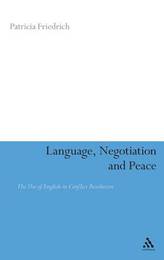
|
Language, Negotiation and Peace: The Use of English in Conflict Resolution
Hardback
Main Details
| Title |
Language, Negotiation and Peace: The Use of English in Conflict Resolution
|
| Authors and Contributors |
By (author) Assistant Professor Patricia Friedrich
|
| Physical Properties |
| Format:Hardback | | Pages:144 | | Dimensions(mm): Height 234,Width 156 |
|
| Category/Genre | Sociolinguistics |
|---|
| ISBN/Barcode |
9780826493736
|
| Classifications | Dewey:306.44 |
|---|
| Audience | | Postgraduate, Research & Scholarly | | Professional & Vocational | |
|---|
| Illustrations |
10
|
|
Publishing Details |
| Publisher |
Bloomsbury Publishing PLC
|
| Imprint |
Continuum International Publishing Group Ltd.
|
| Publication Date |
1 May 2007 |
| Publication Country |
United Kingdom
|
Description
The end of the twentieth- and beginning of the twenty-first centuries have witnessed a large scale increase in demands for international peace keeping mechanisms. Because of a complex history of spread and power, English has become the de facto lingua franca of international communication and negotiation, and the inevitable accompaniment to this is the growth in hostility against the perceived imperialism of the English language. This book argues that the growth of English(es) as a lingua franca has the potential to foster closer bonds between communities, countries and continents. Using the background methodology of Peace Studies, Patricia Friedrich applies political theory to linguistic evidence, to show how English can be instrumental both in the restoration of peace and in the building of social justice. In this analysis, the language classroom emerges as a central site in conflict prevention. A fascinating, innovative study of the place of the English language in the modern world, this book will be of interest to academics researching applied linguistics or world Englishes.
Author Biography
Patricia Friedrich is Assistant Professor in the Department of Languages, Cultures and History at Arizona State University, USA.
Reviews"This pioneering work is clear, insightful, and well-organized. Its author makes a courageous case for using language, and specifically English, for peaceful purposes (inter)nationally, making the book relevant to those researching and teaching languages, psychology, applied linguistics, and peace studies." ~ Professor Dr Francisco Gomes de Matos, Federal University of Pernambuco, Recife, Brazil
|